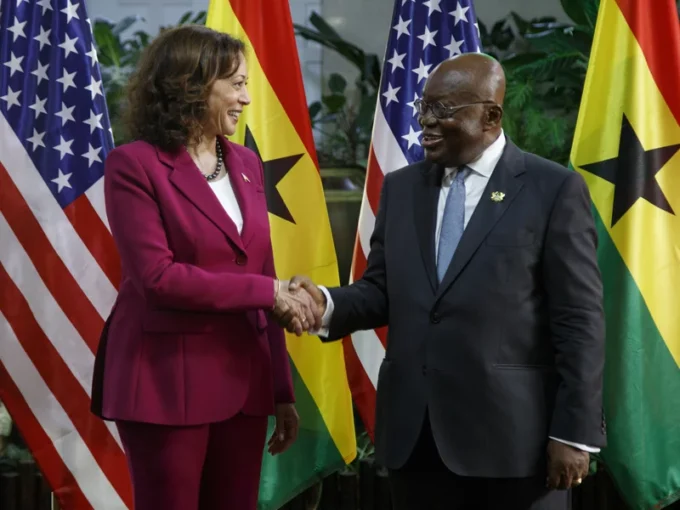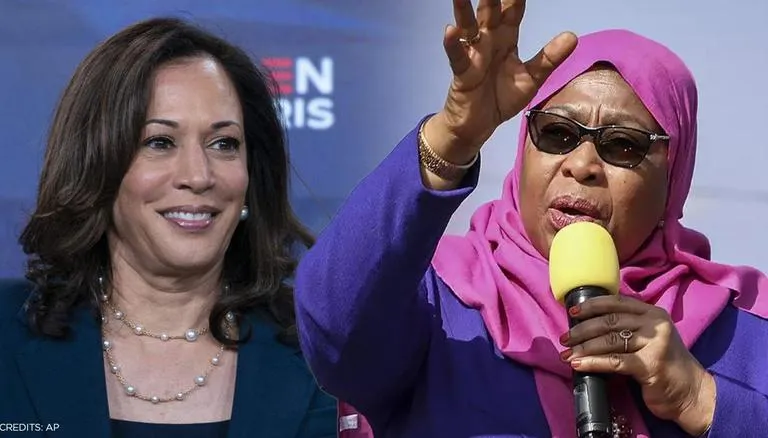Takeaway from Vice President Kamala Harris’s trip to Africa
BY SOUMANOU SALIFOU


Vice President Kamala Harris’s just-completed nine-day trip to Africa was the reaffirmation of the Biden administration’s commitment to partner with Africa, as the president stated during the Second U.S.-Africa Leaders Summit he convened last December in Washington. The vice president was the highest member of the administration to visit the continent, in the complicated global context of Russia’s return to Africa using its military cronies; this at a time when African economies, already brought on their knees by the pandemic, are in shambles as a consequence of the war in Ukraine in which half of African leaders have virtually sided with Russia. What are the gains of the vice president’s trip in this global context unfavorable to the United States’ overture toward Africa, given that China is Africa’s largest trade partner and African leaders look to Beijing whose economic assistance comes with no pre-condition—unlike that of the United States?
The elephant in the room
Addressing a jubilant crowd of thousands who gathered at the Independence Square in Accra, Ghana, the first leg of her nine-day tour of three African nations which also included Tanzania and Zambia, Ms. Harris stated: “We must invest in the African ingenuity and creativity, which will unlock incredible economic growth and opportunities.” Echoing the remarks President Biden had made three months earlier in Washington, she also said the United States is guided, “not by what we can do for our African partners, but what we can do with our African partners.” Translation: U.S. partnership with Africa is driven by the intention to build a mutually beneficial and long-term partnership, not geopolitics.
In a background press call before the trip, a senior administration official had said: “The U.S.-Africa Leaders’ Summit made clear that our relationship with Africa cannot, and should not, and will not, be defined by competition with China. The vice president’s trip will illustrate that we have an affirmative agenda in Africa.” That may be the stated intention, but the heated competition between the two global powers, and previous U.S. officials’ remarks about the matter, are so clear nobody is missing them. Case in point: during the press conference that followed the meeting between the vice president and Zambia’s president, Hakainde Hichilema, on Friday, March 31, reporters brought up the perception of the vice president’s visit as a way to rival China’s influence in Africa. Harris quickly dismissed it saying, “We squarely focused on further deepening Zambia-U.S. ties and how we can work together for the mutual benefit of our people.”
The challenge of rivaling China’s influence in Africa
Put in non-diplomatic terms, sub-Saharan nations, especially in these challenging times of economic hardships born out of the Covid-19 pandemic and compounded by the ripple effects of the war in Ukraine—sharp increase of fuel and food prices—are in dire need of concrete help from anywhere. United States’ partnership with these nations, therefore, hinges on such concrete help.
Long before the current crisis, China had worked hard to become Africa’s biggest trade partner and African leaders’ go-to for economic support, including infrastructural development—the erection of hospitals, highways, bridges, stadiums, and more. A paper published in January 2022 by several respected researchers, Carla D. Jones, Hermann A. Ndofor, and Mengge Li under the title “Chinese Economic Engagement in Africa: Implications for U.S. Policy,” paints the picture of Chinese aggressive involvement in Africa dating back to 1950, culminating today in staggering numbers.
Clearly, though, the Biden administration means business in its no-less aggressive overture toward Africa, though some analysts say Washington has come too late in the game. During the Second U.S.-Africa Leaders Summit which was attended by 49 African heads of state, the administration made impressive commitments to Africa, including a $55bn pledge to support the African Union’s Agenda 2063, among other important financial pledges. To ensure the commitments are kept, the administration has created the position of Special Presidential Representative for U.S.-Africa Leaders Summit Implementation, filled with a U.S. diplomat with extensive experience in Africa, Ambassador Johnnie Carson, who previously served as Assistant Secretary of State for African Affairs and ambassador in several African countries. In the newly established role, the veteran diplomat will oversee the coordination efforts.
The vice president’s bold pledges while in Africa
The U.S. partnership with Africa includes the Biden administration’s commitment to help Africa—the least polluter continent which, ironically, is affected the most by the man-created climate crisis—to mitigate the environmental crisis across Africa. Vice President Harris called on March 31, while in Africa, on the U.S. private sector to help in this area. The call led the private sector to pledge over $7 billion in new commitments, according to an announcement from the White House.

While in Tanzania, where she held talks with President Samia Suluhu Hassan—who last year was on a state visit to China and met with President Xi Jinping, and whose country is among the handful of African nations that voted against condemning Russia’s aggression in Ukraine—the vice president took important steps to strengthen the economic ties between the two nations. They included a memorandum of understanding between the Export-Import Bank of the United States (EXIM) and the government of Tanzania to facilitate up to $500 million in financing to enable U.S. companies exports goods and services in such important sectors as infrastructure, digital technology, power generation, transportation, and energy security.
Amid the rousing welcome Vice President Harris received in Ghana, with President Nana Akufo-Addo giving her the local name Abena for girls born on Tuesday, the Ghanaian head of state raised his concern—shared by several countries in West Africa—about terrorism, calling it a “poison.” Reflecting the fear stemming from sporadic fighting in Burkina Faso with which Ghana shares its northern border, President Akufo-Addo said during the press conference following his tete-a-tete with Harris, “we’re spending a lot of sleepless nights trying to make sure we’re protected here.” In response, the vice president pledged $100 million in assistance. To help Ghana and other regional countries to prop up their defenses against the local offshoots of the terrorist groups al-Qaida and the Islamic state, Washington had previously sent troops to train Ghanaian militaries and their counterparts from other countries.
The American exceptionalism
China is known for its non-interference policy in other countries’ internal affairs in the name of which Beijing provides aid for the extraction of mineral resources, regardless of its African partners’ records in terms of democratization, human rights, or corruption. For its part, the United States largely ties its cooperation to its African partners’ records in these areas. Case in point, the Obama administration in 2014 imposed sanctions against Uganda for its anti-gay laws, saying they are “counter to universal human rights.” The Biden administration joined the world outrage about even tougher anti-gay bill the Ugandan government attempted to push last year. The administration vowed to cut aid to Uganda and all others that pass similar laws. In fact, the commitments the administration made to its African partners during the U.S.-Africa Leaders Summit include partnering on human rights, democracy, and gender inclusion.
True to that American exceptionalism, Vice President Harris, while in Zambia last week, said during her joint press conference with her host, President Hakainde Hichilema, “I am pleased to announce more than $16 million in a new program for Zambia, including a focus on anti-corruption and other reform efforts.”
The Biden White House really means business
Harris’s nine-day visit to three African countries followed the visits of several other members of the Biden administration and the president’s own wife, Dr. Jill Biden. Altogether, they had traveled to more than a dozen countries in all the regions of the continent. The president himself is expected to travel to Africa later this year. That is not to mention the frequent trips to Africa by Secretary of State Antony Blinken and other executives of the State Department. This is a testament to the depth of the administration’s interest in reconnecting with Africa. But it raises the fear of furthering the superpowers’ fight for influence on the continent.

China’s aggressive push for trade and investment in Africa has raised eyebrows among the African elite, as the world second-largest economy shows little concern for the environment or good governance in its breakneck-spree to grab energy resources and new markets all over the world to feed its fast-growing economy. Chinese officials, who are increasingly popular among African leaders who appreciate China’s erection of “free” stadiums, presidential palaces, office buildings, and hospitals, obviously rankle other leading nations in Europe and the United States of America.
In June 2011, during a stop in Lusaka, Zambia in the course of one of her multiple travels to Africa, then-Secretary of State Hillary Rodham Clinton stated bluntly, in a much-applauded speech at the end of a visit there, and in clear reference to China’s high influence in the country: “We saw that during colonial times, it’s easy to come in, take out natural resources, pay off leaders and leave. And when you leave, you don’t leave much behind for the people who are there. We don’t want to see a new colonialism in Africa.”
Russia’s use of a similar approach—arms for the extraction of African minerals—raises the same concerns.
Decades after retreating from the forefront of global affairs in the aftermath of the fall of the Berlin Wall in 1989 and the subsequent break-up of the Soviet Union, Russia recently reemerged on the global stage. Previously seen as a defunct superpower in retreat, the Kremlin unleashed its diplomats and security personnel around the globe to rekindle old ties and create new ones. To stay in power, the leaders in some of the young, vulnerable nations of Africa prone to political instability proved easy prey for Moscow’s extralegal strategy: deployment of mercenaries, disinformation, election interference, and more. All things that are contrary to the rules-based behavior conducive to world order and the will of the African people.
Unlike China and Russia, the United States’ partnership with Africa is intended to center around contributing to the continent’s socio-economic development while promoting values conducive to Africans’ aspirations, which, some analysts say, will bring a breath of fresh air. Others fear it will intensify superpowers’ fight for influence on their continent.

